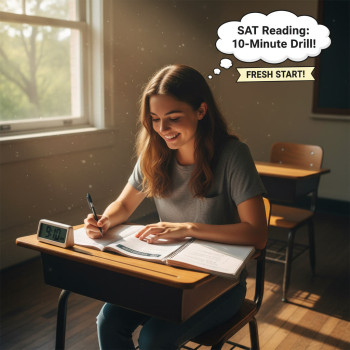The Psychology of High SAT Scorers
It s tempting to think that top SAT performers are born with some special test-taking gene. The truth is more human, and a lot more encouraging: high SAT scores come from a predictable blend of habits, mindsets, and targeted practice. This blog peels back the curtain on what truly distinguishes high scorers—not just how many hours they study, but how they think, plan, and respond on test day.
Why Psychology Matters More Than You Think
Scores are numbers, but the path to those numbers is psychological. The SAT rewards pattern recognition, endurance, and the ability to stay calm under pressure. Two students who study the same material for the same number of hours can get very different scores because one approaches practice with purpose while the other treats practice like busywork.
High scorers tend to make fewer mistakes not because they re smarter on paper, but because they work smarter in their heads. They understand their weaknesses, set realistic micro-goals, and cultivate response habits that activate automatically during the test.
Core Mental Traits of High SAT Scorers
- Adaptive focus: They pivot quickly when a strategy isn t working, rather than doubling down on ineffective methods.
- Curiosity with constraints: They explore why an answer is right or wrong, but within timed practice so curiosity doesn’t become procrastination.
- Resilience to setbacks: Mistakes are data, not destiny. High scorers extract lessons and move on.
- Strategic patience: They know when speed will cost accuracy and when sacrificing a minute is worth a clearer solution path.
- Metacognitive awareness: They reflect on how they think and use that reflection to refine study choices.
Real-World Example: The Difference a Mindset Makes
Imagine two students, Maya and Jamal, who both miss the same question on a practice test. Maya writes the correct explanation in a notebook, then forgets to revisit it. Jamal marks the question, writes the explanation, and schedules a mini-review session for that concept three days later. Which student is more likely to keep the improvement? Jamal s spaced review and active recall make the learning sticky. This small psychological habit—turning a single mistake into a repeated action—compounds into big score gains.
Study Habits That Reflect a Winning Psychology
High scorers develop a toolkit of practices that shape productive study sessions. These are practical, low-sensational changes you can start today.
1. Deliberate Practice, Not Just Volume
- Set specific goals: “Master algebraic manipulation for 12 practice problems” beats “study math for two hours.”
- Break sessions into focused intervals with a single objective, such as speed with accuracy for medium-difficulty questions.
- After each practice block, do a 5-minute reflection: what patterns caused errors, and what will you change next time?
2. Mixed Practice and Interleaving
High scorers mix question types so the brain learns to switch strategies quickly—a critical skill on the SAT when question types arrive in succession. Instead of 50 algebra problems in one sit, mix algebra, geometry, and data interpretation to build flexible retrieval.
3. Timed Simulations With Post-Game Analysis
Full-length practice tests are not just fitness tests for stamina; they are the lab where you analyze pacing, question selection, and recovery from errors. The post-test analysis is where the magic happens. Identify recurring errors and design micro-drills to address them.
Managing Stress: Calm Minds Score Higher
On the SAT, stress shows up as blanking on basic formulas, rushing, or freezing. Top performers build stress-management into their routines so calmness is a practiced state, not an accident.
Breathing, Rituals, and Micro-Routines
- Simple breathing techniques, practiced daily, reduce sympathetic arousal before and during the test.
- Pre-test rituals—like a short warm-up with a few easy practice questions—help signal to the brain that it s time to perform.
- Micro-breaks during practice sessions reinforce the ability to reset focus quickly.
Cognitive Reappraisal
High scorers reframe anxiety as excitement or challenge. Instead of thinking “I might fail,” they think “This is an opportunity to apply what I’ve built.” This shift reduces performance-inhibiting cortisol and improves working memory function.
Strategic Time Management
Time pressure is a built-in SAT variable. The most successful students don’t merely try to be faster; they cultivate timing strategies that optimize accuracy and point yield.
How Top Scorers Approach Timing
- Quick triage: On each section, they quickly classify questions as do-now, revisit, or skip.
- Planned skipping: Skipping is a decision, not a defeat. They balance the opportunity cost of time spent on a tough problem vs points likely gained elsewhere.
- Smart guessing: They know when to eliminate distractors and make educated guesses rather than leave blanks.
The Role of Feedback and Reflection
Feedback closes the learning loop. High scorers don t just get feedback; they structure it to change behavior. They keep records, not just of scores, but of error types, time per question, and confidence levels. This becomes a roadmap for targeted improvement.
| Behavior | Average Student | High Scorer |
|---|---|---|
| Practice style | Long, unfocused sessions | Short, deliberate, goal-oriented blocks |
| Error handling | Cherry-picks questions they like | Tracks errors, schedules reviews |
| Test-day approach | Wing it; hope nerves stay away | Warm-up, rituals, breathing techniques |
| Use of resources | Random study aids | Tailored plans and expert guidance |
How to Build These Traits: A Practical 8-Week Template
This sample plan blends psychology and practice. It focuses less on raw hours and more on the structure of those hours.
| Week | Focus | Key Activities |
|---|---|---|
| 1 | Baseline and habits | Take a diagnostic test; start a study journal; schedule regular short practice blocks |
| 2 | Targeted weak points | Design micro-drills for weakest topics; practice mixed, timed sets |
| 3 | Timing and tactics | Practice triage strategies; simulate sections with pacing goals |
| 4 | Stress resilience | Daily breathing routines, pre-test rituals, short full simulations |
| 5 | Feedback loops | Analyze full tests deeply; create targeted revision schedule |
| 6 | Mixed challenges | Interleaved practice, endurance sessions, mental reset drills |
| 7 | Final polishing | Work on timing exceptions, review stubborn errors, short practice bursts |
| 8 | Test readiness | Two full-length tests, taper volume, focus on confidence and sleep |
Tools That Amplify the Right Psychology
Tools alone don t make you a high scorer, but the right tools shape the habits that do. High scorers often use a combination of practice tests, analytics, and guidance to accelerate learning.
- Practice tests with detailed analytics: Track error types and timing patterns.
- Study journal or tracker: Log your reflections and action steps after each session.
- Accountability partners or tutors: Regular check-ins keep you honest and productive.
Many students find that tailored support makes a qualitative difference. For example, Sparkl s personalized tutoring offers 1-on-1 guidance, tailored study plans, and expert tutors who shape practice into something efficient and psychology-aware. When tutoring pairs human insight with AI-driven insights, patterns pop up faster and study plans become more adaptive.
Why Personalized Tutoring Helps
- External perspective: A tutor spots blind spots you miss because you live inside your own practice patterns.
- Structured accountability: Regular sessions create a rhythm that fights procrastination.
- Adaptive strategies: Expert tutors adjust tactics based on performance trends, not just raw hours.
Common Psychological Pitfalls and How to Avoid Them
Knowing the traps helps you sidestep them. Here are common pitfalls and quick strategies to counteract each one.
- Perfection paralysis: Stop dwelling on a single missed question. Log it, learn it, and move on.
- Overconfidence from narrow wins: Mixed practice prevents the illusion that you’re strong across a topic when you re only strong on a subset.
- Burnout from all-or-nothing routines: Build recovery into your schedule with light days and social time.
- Misplaced comparison: Use personal progress metrics rather than comparing yourself to others on a day-by-day basis.
Test-Day Psychology: Practical Rituals
The day of the SAT is a psychological minefield. Here are concrete rituals top performers use to protect focus and performance.
- Wake up early enough for a calm morning; do a short light exercise and a protein-rich breakfast.
- Warm-up with two or three easy practice questions in each section’s style to get neural pathways firing.
- Practice a 60-second breathing routine you ve rehearsed during study sessions.
- Use a mental cue to move on from tough problems, such as saying “Next” out loud when you decide to skip.
How to Measure Psychological Progress
Tracking psychological growth is subtle but possible. Beyond raw practice scores, monitor these markers:
- Reduced time spent stuck on questions of the same type
- Improved recovery after mistakes during timed practice
- Greater consistency in full-length test scores
- Lower pre-test anxiety ratings over time
Putting It All Together
Top SAT performance is not a product of raw talent alone. It is the result of a suite of psychological traits and tactical habits that you can cultivate. Start small: set clear micro-goals, practice deliberately, schedule reflections, and build rituals for calm and recovery. Use feedback loops to convert mistakes into learning, and consider expert, personalized support when you need targeted acceleration.
Whether you tackle preparation on your own or with a partner, remember that psychology is the invisible architecture of success. The right mindset turns practice into progress, and progress compounds into scores that open doors. If you re looking for guided support, Sparkl s personalized tutoring combines human expertise with AI-driven insights to help convert hard work into focused improvement through 1-on-1 guidance and tailored study plans.
Final Thought
The SAT is a snapshot of performance on a given day. But the habits and psychology you build while preparing last much longer: they help in college classes, scholarship applications, and any situation where focused thought under time pressure matters. Cultivate curiosity that humbly examines mistakes, build rituals that safeguard calm, and make feedback your fuel. Scores will follow—often faster than you expect when practice is guided by the right psychology.
















No Comments
Leave a comment Cancel